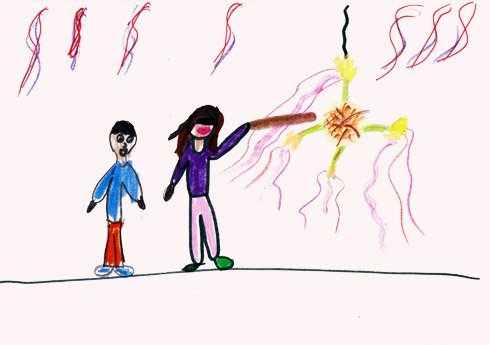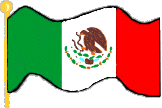Cantos para romper la piñata
"The original piñata is a seven-pointed star that represents the seven deadly sins, on your turn you're supposed to be blindfolded as you strike with the stick, representing that faith is blind and overcomes evil." -Fernando
These verses below are sung as part of the Las Posadas tradition. There's a procession where people go door to door asking for a place to stay like Mary and Joseph the night Jesus was born. When the door to the house is open they sing the Las Posadas Carol. When a homeowner finally lets the group in, there's often a pinata to break. Some these verses can be sung before breaking the piñata. The last three verses in italics are sung while people are actually hitting the piñata...
There's also a short version of the Piñata Song sung while hitting the piñata at Birthday and other parties.

Cantos para romper la piñata
Songs for Breaking the Piñata for Las Posadas
Canción de la piñata
Piñata Song
(Spanish)
(English)
No quiero oro
No quiero plata
Yo lo que quiero
Es romper la piñata.
Echen confites
Y canelones
Pa' los muchachos
Que son muy tragones.
Ándale María
No te dilates
Con la canasta
De los cacahuates.
Ándale Juana
No te dilates
Con la canasta
De los cacahuates.
La piñata tiene caca,
Tiene caca,
Tiene caca,
Cacahuates de a montón.
Dale, dale, dale,
No pierdas el tino,
Porque si lo pierdes
Pierdes el camino.
Dale, dale, dale,
No pierdas el tino,
Mide la distancia
Que hay en el camino.
Ya le diste uno,
Ya le diste dos,
Ya le diste tres
Y tu tiempo se acabó.
I don't want gold,
I don't want silver,
What I want is
To break the piñata.
Throw candies
and mints
For the kids
Who are very greedy.
Come on, Mary,
Don't delay
With the basket
of peanuts.
Come on, Jane,
Don't delay
With the basket
of peanuts.
The piñata has pee,
Pee,
Pee…
Peanuts by the ton!
Hit, hit, hit,
Don't lose the knack,
Because if you lose it,
You'll lose the way.
Hit, hit, hit,
Don't lose the knack,
Measure the distance
That's on the way.
You've hit it once,
You've hit it twice,
You've hit it thrice,
Now your time is up.
Notes
Patty Montes wrote:
The 1st five verses that you post are for when we have finished the song for asking for posada. The song that we sing asking for a place to stay as if we were the Virgin Mary and Joseph. When we come into the house we sing:
Ándale Juana
no te dilates
con la canasta
de los cacahuates.
(Come on, Jane,
Don't delay
With the basket
of peanuts.)
...switching the name for a name of one of the kids at the party and all of the other joke style verses but they have a different rhythm. Yes those are meant as jokes. This is why we say:
No quiero oro
ni quiero plata,
yo lo que quiero
es romper la piñata.
(I don't want gold,
I don't want silver,
What I want is
To break the piñata.)
So we are asking to break the piñata. We then proceed to the piñata and sing only the last three verses (in italics above)."
*****
Fernando wrote:
"You have to adjust how much and how fast or slow you sing, to keep someone from breaking the piñata too soon.
And as kind of a joke, some will sing as a kid's turn is ending (just between family!):
Ese niño / Esa niña es muy listo, (a) / es muy tonto, (a)
es muy listo (a), / es muy tonto (a)
se parece a su mamá / papá
That girl / that boy is really smart, / dumb,
really smart, / dumb,
same as his / her mom / dad
Haha!"
*****
Here are three versions we found on the internet:
En las noches de posadas, (In nights of Las Posadas)
La piñata es lo mejor, (The piñata is the best!)
Y los niños más alegres (And the merriest children)
Le pegan con gran fervor. (Hit it with great enthusiasm.)
***
En las noches de posadas, (In nights of Las Posadas)
La piñata es lo mejor (The piñata is the best!)
La niña más remilgada (The primest girl)
Se alborota con ardor. (Goes wild with zeal.)
***
En las noches de posadas , (In nights of Las Posadas)
la piñata es lo mejor; …(The piñata is the best!)
aun las niñas remilgadas (Even the prim girls)
se animan con gran fervor. (Are delighted with great gusto.)
Comments
Read more about the tradition of breaking the piñata on Mama Lisa's Blog.


Thanks!
Thanks!
Thanks!
Thanks and Acknowledgements
Many thanks to Carlos Arturo Casas Mendoza for contributing some of these verses. Thanks to Corrina Durdunas for the wonderful drawing! Thanks to Fernando for commenting on the piñata tradition and for the extra verse with a translation (the last verse). Thanks to Patty Montes for explaining about how the song is used for Las Posadas. Translation by Lisa Yannucci and Monique Palomares.
¡Muchas gracias!

























